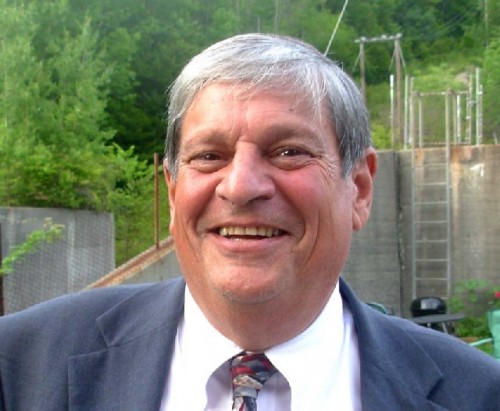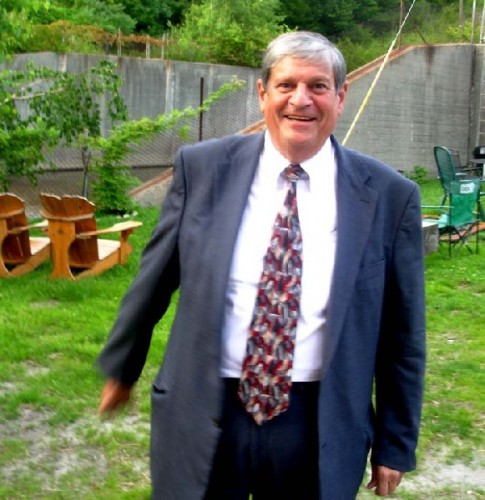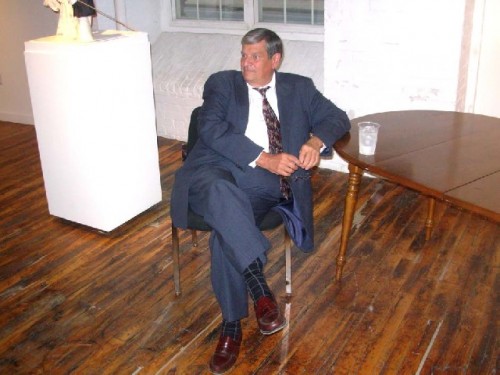Mayor John Barrett Speaks to Eclipse Mill Artists
Overview of 26 Years in North Adams Politics
By: Charles Giuliano - Jul 16, 2009
During opening remarks that lasted some 45 minutes, Mayor John Barrett of North Adams, addressed the artists of the Eclipse Mill in a meeting, with questions that lasted from 8 to 11 PM. He opened with a statement about "Where I have been. Where I am at. And where I am going."
For the first time since he took office in 1984, at 26 years making him the longest running Mayor in the Commonwealth, Barrett appears to be facing a viable candidate in Dick Alcombright. The candidate had previously met informally at the Eclipse, a converted factory that now houses 40 live/ work studio lofts. This was a occasion for the incumbent to express his views in a bid for another two year term.
While widely viewed as having a strangle hold on decision making in the city through the colorful and insightful evening he repeatedly demonstrated his skills to turn a negative perception into a positive. Because of the dominant role he played in converting the vacated Sprague Electric campus into the successful Massachusetts Museum of Contemporary Art, which is celebrating its first decade, Barrett is often invited to speak in other cities. There are many other communities which hope to emulate what was accomplished in North Adams. He advises other mayors that being viewed as dictators signifies that they are successful in executing tough decisions.
When he came to office in 1984, following a career as an elementary school teacher, the prospects for the city, as he described them, were bleak. The city had an unemployment rate of 14% and the CEO of Sprague was being duplicitous. Barrett challenged him to "Stop lying to the people of North Adams." In 1930 Sprague had relocated to North Adams from Quincy. When it shut down that ended 2,000 jobs. Unemployment rose from 14 to 20%. There was a domino effect as other factories in the Eclipse, Beaver and Windsor mills also closed. All over the Berkshires, including mills in Adams, and General Electric in Pittsfield, industry and manufacturing migrated first to the South and then off shore.
Back then the prospects for the city where grim. Being mayor with evaporating resources was a thankless job. At the time he estimated that what is now identified as cultural tourism represented only 7% of the economy. This entailed tourists passing through who gassed up and grabbed a snack on the way to a day trip in Williamstown for the Williamstown Theatre Festival, the Clark Art Institute and Williams College.
While Williams was sending students and faculty to assist third world countries Barrett contacted the President of Williams with a plea for help to revive the economy of North Adams. Tom Krens, then the director of the Williams College Museum of Art had an idea to develop an abandoned mill complex, initially considering the Beaver, Eclipse or Windsor mills, into a warehouse for minimal art.
"He talked about the Windsor Mill," Barrett recalled. "Because he had a t-shirt business there when he was a student at Williams. The city owned the mill and I had tried to sell it (the city still owns this and a number of other properties). The best bid I could get was $75,000. Krens often says that the idea for Mass MoCA came to him when he was on the Autobahn in Germany (having come from a factory like Kunsthalle). But that's not what he told me that day in my office. He had just been in LA where the Contemporary Museum, during renovation, planned to relocate to a vast factory as the Temporary Contemporary. He told me that a lot of art was in storage. He explained to me what contemporary art was."
After that initial meeting Barrett called the attorney John Derosa. "At the time the infrastructure of the city was terrible." In a matter of days "I fell in love with the idea of Mass MoCA." It would be 14 tough years following that first meeting with Krens, who left Williams to become director of the Guggenheim Museum in New York. He has since been forced out by the Board. When Krens departed the Mass MoCA project was taken on by his protégée, Joe Thompson.
Governor Michael Dukakis (Democrat) signed a bill to designate $35 million to develop the Sprague Campus on his last day in office. The Republican who succeeded him, William Weld, immediately killed that during his first weeks in office. Barrett with support from Jane Swift and Daniel Bosley prevailed on Weld to reconsider and to at least visit the city and view the property.
Looking back Barrett quoted the historian James Michener who wrote that "North Adams is a classic example of urban blight." Barrett described the city as "an absolute mess." He went through a punch list of issues and problems including high rates of teenage pregnancy, sub standard housing, unemployment, crime, drugs schools in disrepair. "Because of the impact of Prop 2 ½ we had just $5,000 a year to buy books for 2,200 students."
Through that time the one ray of hope was the potential to develop Mass MoCA. Initally Krens was not interested in the Sprague Campus with its 28 buildings. "It took eight years to own that property" he said. "For a long time the only person returning my calls was Krens and I was the only person returning his calls. Eventually my dream came true. Every idea I got came from someone else. Like Eric Rudd (owner of the Beaver Mill who developed the Eclipse Mill. Twelve years ago he opposed Barrett in a campaign for Mayor) One year he likes me and one year he doesn't."
He describes how Rudd came to a committee meeting and proposed a change to sidewalk design. While Rudd was ridiculed at the time Barrett acknowledged that it was a good idea that was eventually adopted. While "borrowing" the ideas of others Barrett relates the level of resistance to Mass MoCA. He cites more than 100 articles and editorials in the Berkshire Eagle that opposed the concept. He quoted a politician in the Boston Globe who described the project as a "Boondoggle."
When Walmart wanted to build in North Adams Barrett told of how "I asked them for $75,000 dollars. They said 'Cash or Check.' I explained it was not for me but to help improve the down town. In 1992 they gave me a check and I used the $75, 000 to buy the Mohawk Theatre to restore it in a way that we can use it." The building proved to be complicated and it became necessary to buy two adjacent buildings for an addition $200,000. The city is about to complete phase one of renovating the former E. M. Lowe's movie house. "It's in pretty good shape and I have talked with Mary Grant of MCLA and Joe Thompson of Mass MoCA about ways to use it."
The development of the theatre is problematic. Because it was never a vaudeville house there is no adequate stage, dressing rooms, or back stage to handle the kinds of productions appropriate for a 900 seat venue. Barrett considered but rejected a multi million dollar plan to rip out the back and construct an adequate multi purpose venue. The function of the theatre is so limited that there is a concern that it will be more of a liability than an asset. Pressed on this when the evening was opened for questions he appeared to have no real answers for how to create a stage for anything beyond bare pipe productions. It will be in essence a refurbished movie house where the Mayor recalled having seen "Gone with the Wind."
While Barrett gets things done, like some gentrification of the down town with a center section of floral plantings, better street lights, Holiday lights, street cleaning and snow removal he complained that he gets no support from the business community. He compared that to some $40,000 from merchants in Pittsfield. Instead he listed the many projects "I (the city) pay for." This ranged from Rudd's annual Beach Day on Eagle Street (yesterday), Ralph Brill's project last year to light the Hoosac River, Open Studios, DownStreet, as well as food fairs and parades. It is more accurate to say that the Mayor has provided some seed money.
It was suggested to him that in a struggling business environment there aren't the resources to make contributions toward downtown improvements. Despite the lack of foot traffic rents are high. Those who do sign leases are often not able to meet annual increases. Barrett stated that he has interceded to prevail on landlords not to raise rent. He stated that since Mass MoCA there have been 9 restaurants that opened and remain in business. Although there has been turnover in ownership and management. Cafe Latino, on the Mass MoCA campus is about to close but Barrett said that "There are five or six new businesses eager to move in."
"I don't have a master plan" he said. "There is no point to commissioning an expensive study that just sits on a shelf. I've got a vision for the city and it has to be inclusive." That conveyed the notion of trust me, I've done this for 26 years, and I know what I'm doing.
Part of that approach of keeping it all in his head often equates to a perception that Barrett says no as often as he says yes. After 26 years in office a politician accrues a lot of power. It means imposing personal taste for how the city should look and function. This micro manages down to limits on the scale and design of business signs, hours for business operation, traffic, and noise levels. North Adams is known for the complexities of obtaining permits or establishing business. He deflects this by saying that these are committee and department decisions.
When Cup and Saucer programmed live music Barrett explained it was not shut down by the City but rather by the landlord deferring to tenants living above the café. He discussed a trend of downtown property owners, a couple of individuals control most of the commercial space, who are selling condo units. These are averaging $250,000 to $300,000 for a 1,200 square foot unit. He views this as a vital part of the equation to revitalize the business district. But this mixed use also results in different agendas between residents and the business operating below them. He was asked if the city had the authority to mandate sound proofing between business and residences. There was no clear answer on this point.
He discussed issues of improving schools, public services, and contracts with police and firefighters. The Mayor has been known for keeping taxes low. The Eclipse residents have seen their equity double in a relatively short time. This is reflected by the cost of those new downtown condos at comparable prices with half the space. Can the artists anticipate an increased property tax? Barrett reassured them that he has no such plan and instead seeks other sources of revenue such as an increase on hotel tax. He described communities that nickle and dime its citizens with fees for services.
With a sense of dire prediction he stated that in the current economy, there is a decline in federal and state revenue. "The next two years will be tough" he said. "The challenge is as great as it was when I took office in 1984. It is possible that everything may be lost that it took all this time to build." He spoke with nostalgia of Bill Clinton who supported cities. Barrett described tough meeting with Governor Patrick who is tapped out having spent two years of Stimulus money. The state's cupboard is now bare.
He asked the artists if anyone had seen the documentary "Downside Up" which related the compelling story of building Mass MoCA and the recovery of North Adams. He described the shame factor than nobody wanted to be associated with North Adams. It came with such negative branding. North Adams State College, for example, was renamed Massachusetts College of Liberal Arts (MCLA) to get rid of the stigma that made it tough to recruit students.
Engaging the group of artists he said in essence that you wouldn't be here except for me. The inference is that Mass MoCA, the magnet that drew us to the region, would not exist without his personal persistence. Or his signing on board to a zoning change, passed through quickly, when Rudd proposed developing the Eclipse Mill. It was implied that it was his vision that has advanced the city and will continue to do so under his leadership. He repeated several times that "The best is yet to come." Like the recent sale of the Holiday Inn for $2 million with a mandate for another $3 million in renovation. The 102 room hotel, which was built just 18 years ago, sold several years ago for $226,000. He also described plans for a new boutique hotel within the next two years. Also that there is a contract for Lowe's to occupy the abandoned mall on Route 8. In this economy the corporation prefers to pay fines rather than develop the property according to Barrett.
He discussed other successful city initiatives including Heritage Park and the $2 million renovation of the city owned hockey rink. There was also the effort to "save the YMCA."
There were a variety of questions. What growth can the city see in the next five to ten years? How is progress coming on developing a bike path connecting to Williamstown. Will there ever be a highway connection to the Mass Pike? (No) Can we get a stop sign in a dangerous intersection? Will there be more seating, parks and recreation areas in the downtown? Is it possible to close traffic on Eagle Street on Saturday mornings for the Farmer's Market? When will be get better signage? What is the current occupancy level for retail business in North Adams? (Answer 70%). Should the city market and promote itself? (No, not our job, something for the business community and private sector.) What is the cost to renovate the Mohawk Theatre ($6.5 to $7.5 million).
Overall the mood of the artists was attentive and respectful. There was a consensus that it had been a productive and informative meeting. As the campaign progresses there are two debates planned. In that context the candidates will face a panel of journalists and one may imagine tougher questions.





